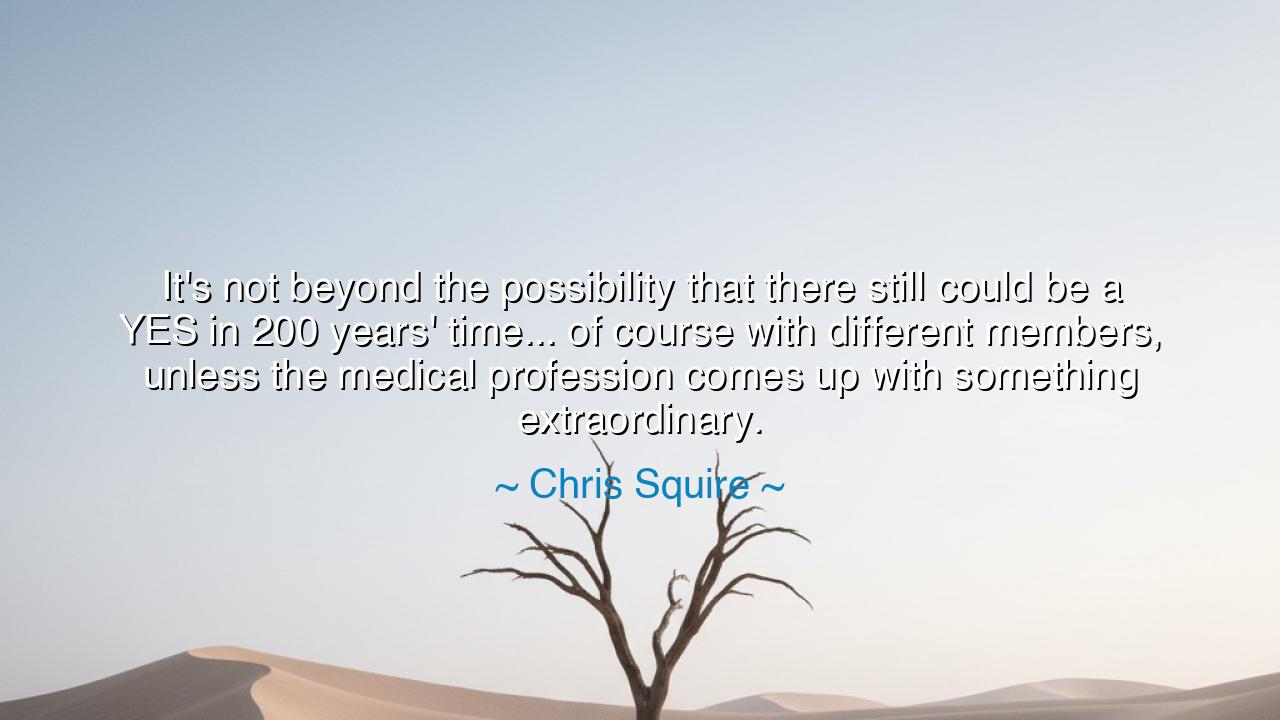
It's not beyond the possibility that there still could be a YES
It's not beyond the possibility that there still could be a YES in 200 years' time... of course with different members, unless the medical profession comes up with something extraordinary.






When Chris Squire proclaimed, “It’s not beyond the possibility that there still could be a YES in 200 years’ time... of course with different members, unless the medical profession comes up with something extraordinary,” he was speaking with both humor and vision. These words are not merely about a band, nor about medicine; they are about the endurance of human creation, the power of legacy, and the way art transcends the fleeting span of a mortal life. The laughter in his tone is but a veil; behind it lies a profound reflection on the permanence of spirit in contrast to the impermanence of flesh.
The band YES was more than a gathering of musicians—it was a living vessel of creativity, carried forward by each generation of players, each member adding new breath to its sound. Squire, as one of its founding lights, knew that while bodies weaken and lives fade, music, once born, has the power to continue long after the hands that first shaped it have turned to dust. His nod to the medical profession was a playful acknowledgment of mortality: unless medicine could cheat death itself, the faces of YES would change, but the flame of the band might still endure.
Here we find echoes of ancient truths. Think of the Greek dramatists—Sophocles, Euripides, Aeschylus—whose works are still spoken aloud thousands of years after their deaths. Though the actors and audiences have long changed, the plays endure. So too, Shakespeare’s words are performed anew by fresh voices, centuries beyond his grave. The original creators do not survive, but the creation continues to breathe. Squire’s vision of a YES two centuries hence belongs to this same lineage: art, once given to the world, belongs no longer to time, but to eternity.
There is also within his words the subtle recognition of renewal through change. The YES of 200 years from now, if it were to exist, would not be the same as the YES of Squire’s day. It would carry different members, perhaps even a different sound, yet still bear the essence of what began long ago. This is how all living traditions survive. The Roman Empire fell, yet Roman law shaped Europe for centuries. The Buddha’s teachings spread far beyond India, carried by voices he never met. The seed is planted once, but the tree grows in many forms.
In his jest about the medical profession, we find a reminder of mortality that every generation must face. Even if science were to extend life, it cannot grant immortality of spirit within a single body. Immortality belongs not to flesh, but to legacy—what is passed on, remembered, and carried forward by others. To hope for a YES in 200 years is to hope that what one creates today has the strength to outlive the creator. And indeed, this is the dream of every artist, teacher, leader, and parent: that their work shall echo when they themselves are silent.
Consider also the story of Homer, whose life is half-legend, half-shadow. We know not if he lived exactly as told, but his epics—the Iliad and Odyssey—still shape the imagination of humankind after three millennia. This is the destiny of true creation: to outlast its author, to stride into centuries where the author’s name is but a whisper, yet the work remains vibrant. Squire’s quote reminds us that even a band, born in the 20th century, may join this chorus of voices that echo across ages.
The lesson for us is clear: seek to create that which outlives you. Do not measure your efforts by immediate applause alone, but by the depth of the seed you plant. Whether through music, words, kindness, invention, or example, strive to leave behind something that future generations can inherit, reshape, and renew. Legacy is the true answer to mortality, and creation is the one road by which ordinary lives step into eternity.
Practical wisdom follows: do not wait for medicine to grant you more years. Instead, live each day planting works, deeds, and words that will echo beyond your lifetime. If you are an artist, create boldly. If you are a teacher, pass on wisdom. If you are a parent, nurture strength and virtue in your children. And if you are simply a soul upon the earth, remember that every small act of goodness sows a seed that may bloom in centuries to come. Thus shall your own “YES” endure—an affirmation of life, still heard long after you are gone.






AAdministratorAdministrator
Welcome, honored guests. Please leave a comment, we will respond soon